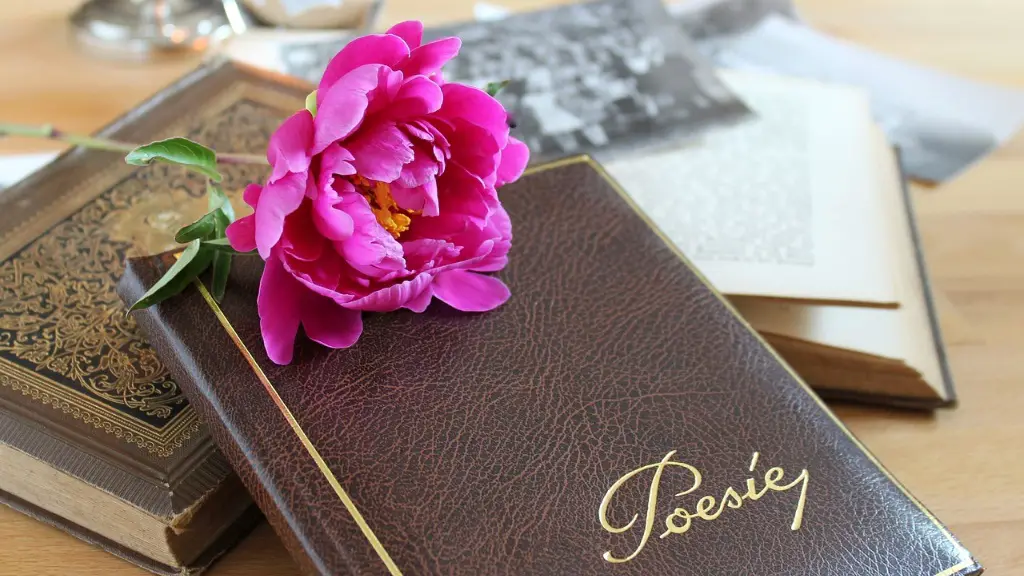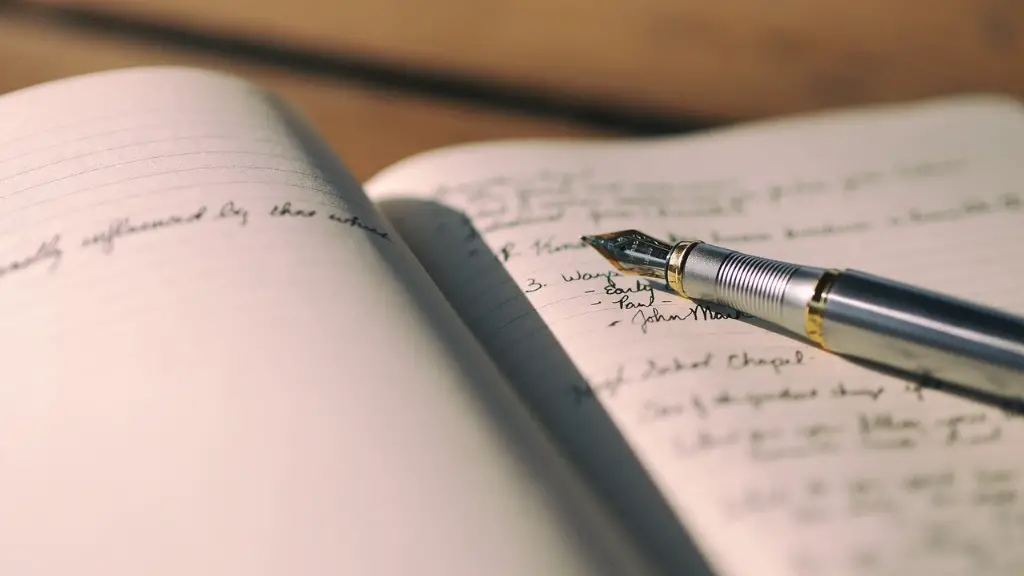Main Topic: What is a Speaker in Poetry?
In poetry, the term ‘speaker’ refers to the narrator or character in a poem who may be real-life, fictional, or a combination of both. The speaker acts as a tool for conveying the thematic and emotional content behind any given poem, as well as for exploring different ideas, forms, and even the stylistic elements of the poem. Essentially, the speaker is an important device for allowing the author to communicate his or her message to the reader.
The concept of the speaker in poetry was first popularized in the late 18th century, with the advent of the Romantic period of literature. During this period, poets began to create works which focused on the individual voice as a means of delivering a message or theme. This shift away from the traditional emphasis on structure and form to emphasize the individual voice and perspective of poets was a revolutionary approach which allowed authors to delve into their emotions and internal states of being in a new way.
While the speaker can be any character or entity the author or poet chooses, it is important to note that their identity is not necessarily the same as that of the author. The speaker can be a voice that conveys a message to a certain audience, a character existing in the poem, or even an entity conveying a message from the author’s past. Sometimes the speaker can even be an object or an animal. In Modernist poetry, the speaker may even be an abstraction, allowing the poet to explore a range of ideas and themes from different perspectives.
The speaker in a poem can be used to illustrate the inner thoughts and feelings of the character, to provide a commentary on wider societal themes, or to reveal the internal states of being that lie beneath the surface of everyday life. By using the speaker to explore a range of perspectives, authors can create a powerful and emotive narrative that is unique to the poem.
The use of the speaker in poetry is a powerful way to engage readers and to provide an insight into issues and ideas which otherwise may not be explored. The speaker acts as a conduit for the readers to explore different angles and interpretations with regards to the theme of the poem. Furthermore, the use of the speaker helps to create a dynamic and emotive environment which can be utilized to provoke thought and discussion around different issues.
Potential Impact of the Speaker in Poetry
One of the key ways in which the speaker can be used in poetry is to illustrate the impacts and effects of different moments or experiences. By using the speaker to convey a range of perspectives and emotions, authors can help to provoke thought and discussion around certain issues or topics. For instance, authors can use metaphors, similes, and diction to capture a range of feelings and perspectives which can serve to bring attention to issues which may not otherwise be explored.
The use of the speaker in poetry also plays an important role in creating a richer understanding of the inner workings of any given character or persona. By exploring different nuances and nuances, authors can create a more in-depth character which can be used to illustrate the complexity and subtlety of any given attitude or emotion. By exploring the perspectives of these characters, authors can create a dynamic environment which can be used to provoke thought and challenge readers to think more deeply about any given topic.
Finally, the speaker in poetry can be utilized to explore and convey wider societal values, attitudes, and norms. By exploring different attitudes and beliefs through the speaker, authors can create an environment which captures the societal and cultural influences which often shape our worldview. By confronting readers with different cultural influences, authors can challenge readers to think critically about the various influences which shape their own beliefs and attitudes.
How the Speaker is Metaphorically Used in Poetry
The speaker in poetry can also be used to explore and convey broad or abstract themes and ideas. By using the speaker to metaphoricaly depict different themes and concepts, authors can create a powerful atmosphere in which to illustrate subtle nuances which can be difficult to capture in conventional forms of literature.
For instance, authors can use the speaker to explore abstract themes such as love, death, and the passing of time. By using the speaker as a tool to convey these themes in a metaphorical manner, authors can create a powerful atmosphere which enhances the emotive, thematic, and symbolic content of the poem. Furthermore, this can be used to explore and challenge traditional beliefs and norms – by using the speaker to explore different aspects of life, authors can provide a unique insight into the lives and experiences of any given character or persona.
Additionally, authors can use the speaker in poetry to explore and challenge traditional beliefs and attitudes. By using the speaker to challenge the status quo, authors can illustrate the intricacies and complexities of any given experience or perspective. Furthermore, by challenging preconceived notions, authors can serve to highlight how our own values and beliefs can shape how we interact with and interpret different perspectives and experiences.
Exploring the Different Perspectives of the Speaker in Poetry
In addition to its potential for exploring themes and challenging traditional views and attitudes, the speaker in poetry can also be used to explore different perspectives. By exploring the perspectives of others, authors can create a unique atmosphere which helps to illustrate how different individuals view and interpret the same event or experience.
By using the speaker as a tool to explore different perspectives, authors can also create a dynamic environment in which to explore the strengths, weaknesses, feelings, and emotions of various characters. Additionally, authors can use the speaker to explore cultural, political, or societal issues which may not be explored in conventional forms of literature. By exploring different perspectives, authors can help to challenge readers to think more deeply about the various issues which are often overlooked or taken for granted.
Additionally, the speaker in poetry can be utilized to explore personal reflections or insights. Authors can use the speaker to delve into their innermost thoughts and feelings, as well as to explore their own experiences, beliefs, and attitudes. This can be a powerful tool for conveying personal insights and opinions in a unique way that can often be more effective than traditional forms of literature.
Examining the Use of Irony and Subtext in Poetry
The author can also use the speaker in poetry to explore irony and subtext. By utilizing irony, authors can challenge the preconceived assumptions of readers and confront them with different views and interpretations of the same event or experience. Additionally, authors can use irony as a tool to illustrate deeper meanings and implications behind any given poem.
By using the speaker to explore irony and subtext, authors can challenge readers to think critically and objectively about any given point of view or experience. Additionally, authors can use irony to provide a greater depth of insight into any given theme or idea. Furthermore, authors can use irony to challenge the status quo, thus providing a unique and thought-provoking insight into a range of issues and topics.
Finally, authors can use the speaker in poetry to illustrate the impact of language and its ability to convey a range of feelings and emotions. By exploring the linguistic complexities of any given text, authors can provide an insight into how words and phrases can be used to evoke powerful emotional responses from readers. This can be a powerful tool for conveying the nuances of any given emotion or feeling, thus allowing authors to create a unique and powerful atmosphere within their poems.
Exploring How the Speaker Can Be Used to Challenge Audiences
The speaker in poetry can also be used to challenge audiences. By utilizing the speaker as a tool for conveying the poet’s message, authors can challenge readers to think differently and to explore different points of view and interpretations. Additionally, authors can use the speaker to explore and challenge traditional beliefs and attitudes, thus enhancing the emotive, thematic, and symbolic content of any given poem.
Furthermore, poets can use the speaker as a tool to explore the ideas of identity and individuality. By exploring and challenging traditional ideas of identity, authors can create a dynamic environment in which to explore the complexities and nuances of any given character or persona. This can be a powerful tool for conveying the uniqueness and uniqueness of any given individual, thus providing a unique insight into the lives and experiences of any given character or persona.
Additionally, the author can use the speaker to explore how memories and experiences of the past shape our present and future. By exploring the memories, beliefs, and experiences of past and present, authors can create a unique atmosphere in which to explore the mysteries and complexities of life. Furthermore, by using the speaker to explore memories of the past, authors can provide a unique insight into how our past can continue to shape our present and future.
Conclusion of the Role of the Speaker in Poetry
In conclusion, the speaker in poetry plays an important role in conveying the thematic content behind any given poem, as well as for exploring different ideas, forms, and stylistic elements. The speaker acts as a tool for allowing the author to communicate their message to the reader, allowing authors to explore a range of perspectives and concepts and to challenge traditional beliefs and norms. Furthermore, the use of the speaker can help to create a powerful and emotive narrative which can be utilized to provoke thought and discussion around different issues. Ultimately, the speaker is an important device for allowing authors to create powerful and emotive works of literature which can help to provoke thought and dialogue.





